November 13, 2024 | 12:12 GMT +7
November 13, 2024 | 12:12 GMT +7
Hotline: 0913.378.918
November 13, 2024 | 12:12 GMT +7
Hotline: 0913.378.918
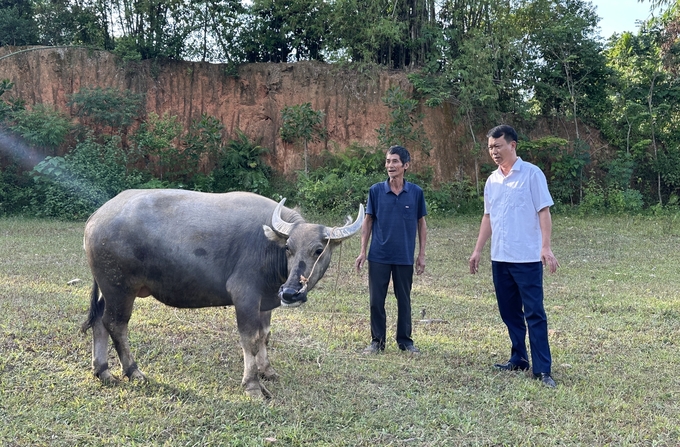
A breeding buffalo after one year under the care of farmer Nguyen Van Ha. Photo: Quang Linh.
Nguyen Van Ha, a farmer from Phu Nghia Hamlet, Khoi Ky Commune, Dai Tu District, Thai Nguyen Province, has earned a reputation for his livestock-tending techniques and a healthy, well-fed buffalo herd. Less than one year after receiving a breeding buffalo from the local poverty reduction support program in December 2023, Ha recently welcomed a strong and healthy calf into his herd.
Ha's cattle herd features large, muscular, and healthy buffaloes, with a distinct absence of infectious diseases since their arrival. He noted that, after receiving the breeding buffalo from the support program, his family has followed the guidelines provided by the cooperative and veterinary authorities. Notably, they strictly complied with the principle of "prevention over cure."
"I clean and disinfect the barn on a regular basis. I frequently clear brush and unclog drainage in grazing sites and areas surrounding the barn to limit disease risks. In addition, my buffaloes are always the first in line when vaccination schedules are due," Ha revealed his secrets to raising a healthy herd of buffaloes.
Similarly, Nguyen Quang Nghi, a farmer from Hoa Binh Hamlet, Khoi Ky Commune, who received a buffalo in December 2023, has also reported healthy and disease-free growth in his livestock herd.
"The buffalo is a valuable asset that allows our family to rise out of poverty, so I must tend to the herd with responsibility. I inspect the buffaloes every day for unusual symptoms, and I immediately report any issues to the local officials," Nghi explained.
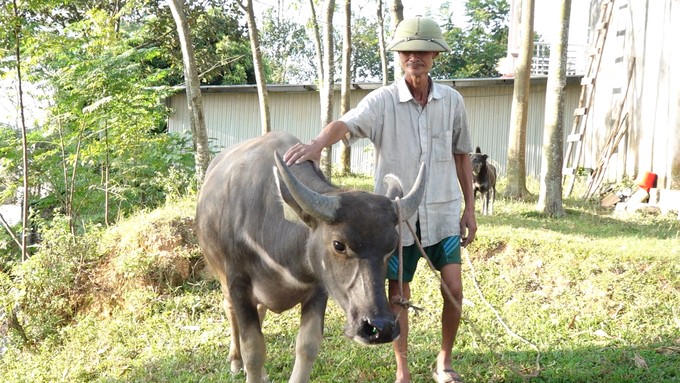
Since its arrival, the breeding buffalo belonging to Nguyen Quang Nghi's family has not contracted any infectious disease. Photo: Quang Linh.
Both Nghi and Ha are hardworking farmers; however, they lack the capital to invest in high-quality livestock breeds. With government support for breeding stock and official guidelines, these families have followed the prescribed rearing and disease prevention measures, resulting in healthy buffalo growth.
As part of the National Target Program for Sustainable Poverty Reduction for the years between 2021 and 2025, Dai Tu District approved a Community Production Development Support Project under Sub-project 1 of Project 3, which focuses on agricultural production support.
Sub-project 1 involves the participation of impoverished, near-impoverished, and newly out-of-poverty households. Accordingly, these households are members of cooperatives specializing in tea cultivation and the breeding of buffalo and cattle in the communes of An Khanh, Tan Thai, and Khoi Ky.
With terrain consisting of low hills and an interspersed system of rivers, streams, and canals, Khoi Ky Commune houses favorable conditions for livestock development. However, local livestock herds are limited in terms of size and concentration, which severely impacts the commune's advantage for animal husbandry.
The "Breeding Buffalo Support for Sustainable Poverty Reduction in Khoi Ky Commune in 2023" project aims to raise income levels for local farmers, facilitate sustainable poverty alleviation, minimize poverty risks, and reduce the income and living standard gap among neighborhoods and households across the commune.
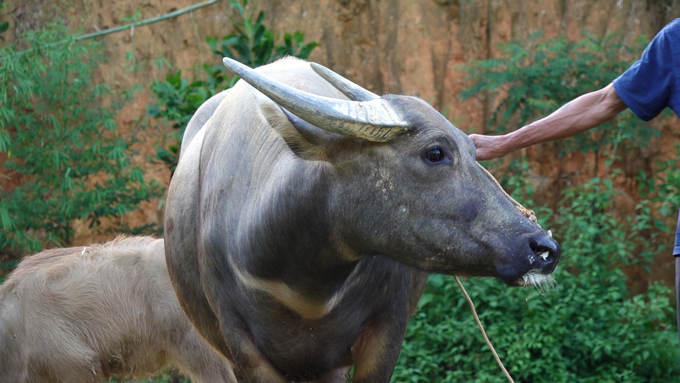
Ha's secret to raising healthy buffalo lies in proactive and preventive disease management. Photo: Quang Linh.
Spanning from July 2023 to July 2025 with a total budget of over 370 million VND, the project supports buffalo and cattle breeders with livestock and tending techniques. With 60% of the funding from the State, participating households in Sub-project 1 contribute 40% of the costs.
The project enables impoverished and near-impoverished households to access new scientific techniques, thereby enhancing their knowledge and skills in buffalo breeding. By reducing the number of impoverished and near-impoverished households, the project can promote the economic benefits of household farming in addition to enhancing the development of cooperative economies and cooperatives.
Beneficiaries under the project include the Khoi Ky Commune Sustainable Poverty Reduction Breeding Cooperative, which comprises 10 members from impoverished households.
With the aim of promoting the project's success, Pham Van An, head of the Khoi Ky Commune Sustainable Poverty Reduction Buffalo Breeding Cooperative, reported that the cooperative is actively encouraging local residents to vaccinate their livestock herds.
“Farmers should fully implement safe and biosecure breeding practices, efficiently manage livestock, water sources, and feed, and enhance livestock tending efforts to boost disease resistance. Notably, it is essential to conduct regular cleaning, disinfection, and sterilization to eliminate pathogens and prevent disease outbreaks in compliance with instructions from local authorities and relevant agencies,” Pham Van An emphasized.
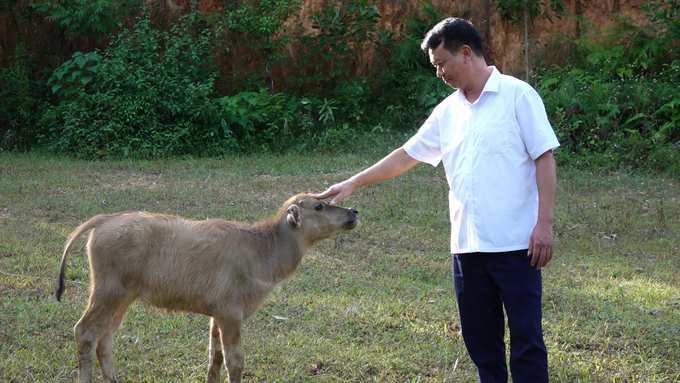
A lively and healthy calf born to a buffalo from the project. Photo: Quang Linh.
Le Anh Tuan, Deputy Chairman of the Khoi Ky Commune People’s Committee, highlighted that before delivering the livestock to residents, local governments enforced a strict quality control process. Accordingly, the breeding stock exhibited excellent health conditions, had verified origin, and underwent all required quarantine procedures before being integrated with the local herds.
The commune also organized education programs to raise awareness regarding the risks of livestock diseases and preventive measures. Additionally, the local government provided detailed guidelines for biosecure breeding practices, with a focus on utilizing the correct technique, regular barn sanitation, seasonal adjustment, and weekly disinfection using approved sanitizing agents.
In response to the increasingly complex disease developments until the end of the year, the Khoi Ky Commune People’s Committee will strengthen its control over the local livestock population, organize regular disinfection at markets, slaughterhouses, and in processing sites for buffalo and cattle products.
Furthermore, the commune will enforce strict protocols for sanitizing civilians and vehicles entering or exiting livestock sites in compliance with a comprehensive five-step biosecurity process. On the other hand, relevant agencies may launch large-scale environmental sanitation and disinfection campaigns to actively eliminate and prevent the spread of the disease based on local disease control needs.
Deputy Chairman Tuan urges residents with sick livestock animals to immediately report to local veterinary officers, providing accurate information on the disease as required.
“We must immediately isolate infected animals in a designated quarantine area, far from water sources or feed supplies for other buffalo and cattle; increase nutrition in feed to boost livestock immunity; avoid selling, transporting, slaughtering, or discarding infected or decased animals into the environment,” Deputy Chairman Tuan emphasized.
The project aims to achieve an 80% poverty reduction rate among participating households by its conclusion. By breeding buffalo for reproduction, farmers may not benefit from immediate profits in the first year. However, they can utilize buffalo manure as fertilizer for crop production.
From the second year onward, female buffalo will produce calves, providing breeding stock for the participating households. This approach can increase income from livestock production, enhance the economic efficiency of impoverished and near-impoverished households, and support families in stabilizing their livelihoods, thereby achieving sustainable poverty alleviation.
At present, the most effective solution for preventing lumpy skin disease and hemorrhagic septicemia in buffalo is vaccination. Accordingly, local veterinary officers regularly request residents to follow the vaccination schedule set by higher-level agencies.
Translated by Nguyen Hai Long

(VAN) In Mai Son district, over three years, more than 1,000 households have received livestock training and support for linking to product consumption markets.
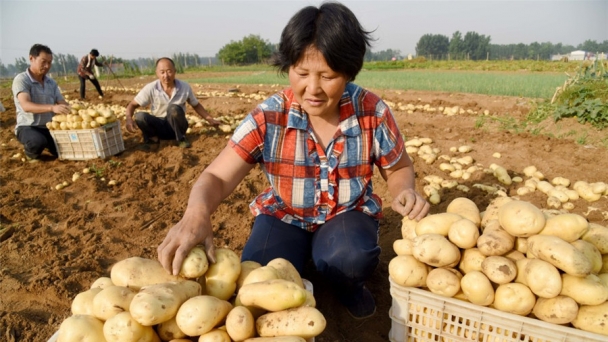
(VAN) Among CIP's most notable achievements in China is the development of potato varieties such as 'Cooperation-88' and 'Jizhangshu', which currently cover about 20 percent of all potato production in the country.

(VAN) In 2023, the total forest area eligible for ERPA payments in Thua Thien - Hue province is 204,022.11 hectares out of a total of 282,787.19 hectares.

(VAN) Correct fertilizer usage encourages farmers to increase the application of organic fertilizers, thereby establishing a closed-loop system and advancing toward circular, green agriculture.
/2024/11/09/2017-3-091734_126.jpg)
(VAN) Dare to think and dare to do, Mr. Chien invested in a modern cold barn system for the oursourcing farming of more than 2,000 pigs/litter for C.P. Vietnam Corporation.

(VAN) The Dakrong Nature Reserve, with its rich biodiversity and stunning landscapes, and eco-tourism development is gradually striving to become a National Park.
/2024/11/08/4513-2-223640_225.jpg)
(VAN) Although he considers himself a meticulous person, Mr. Su is proud because it is an effective habit that has helped him keep his pig herd safe up to this point.